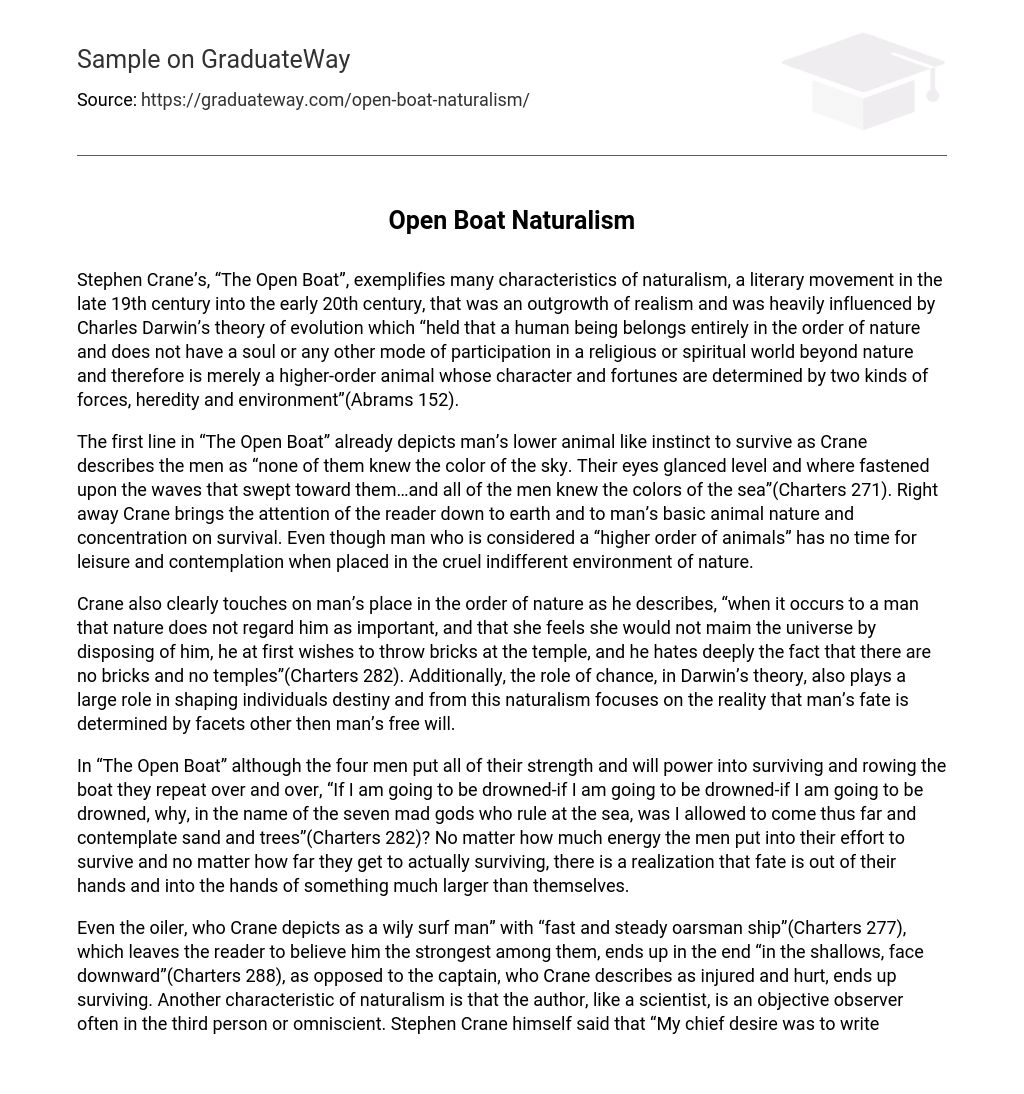Stephen Crane’s “The Open Boat” demonstrates numerous qualities of naturalism, a literary movement that emerged in the late 19th century and continued into the early 20th century. Naturalism evolved from realism and drew significant inspiration from Charles Darwin’s theory of evolution. This theory proposed that humans are inherently part of nature and lack a soul or any connection to a religious or spiritual realm beyond the natural world. According to this perspective, humans are essentially advanced animals whose personality and fate are influenced by two primary factors: genetics and surroundings (Abrams 152).
The opening line of “The Open Boat” highlights mankind’s primal instinct for survival, as Crane describes the men as lacking awareness of the sky’s color. Their focus is directed towards the approaching waves, and they are all familiar with the colors of the sea (Charters 271). Crane immediately brings the reader’s attention to humanity’s animalistic nature and their intense concentration on staying alive. Even though humans are considered to be a more advanced form of animals, they have no opportunity for leisure or reflection when confronted with the harsh and indifferent natural world.
Crane also addresses the concept of man’s place in the natural order. He illustrates this by stating that when a man realizes that nature does not consider him important and would not harm the universe by getting rid of him, he initially desires to throw bricks at temples. He deeply resents the fact that there are no bricks or temples available (Charters 282). Furthermore, Darwin’s theory emphasizes the significance of chance in shaping an individual’s destiny. Naturalism thus highlights the fact that man’s fate is influenced by factors beyond his control, rather than his own free will.
Despite their desperate efforts to row the boat and stay alive in “The Open Boat,” the four men repeatedly express their disbelief, questioning why they were allowed to come this far in their struggle against the sea. Their repeated exclamation, “If I am going to be drowned,” highlights their realization that their fate lies beyond their control and in the hands of a higher power (Charters 282). Regardless of the tremendous determination and energy they exert, they come to understand that their survival is ultimately dependent on something far greater than themselves, as they contemplate the sight of sand and trees.
The oiler, depicted by Crane as a cunning surf man with remarkable oarsmanship, ends up in the shallows face down, suggesting his initial strength may not have been genuine (Charters 277)(Charters 288). In contrast, the captain, described by Crane as injured and harmed, manages to survive. Another characteristic of naturalism is the author’s role as an objective observer, often adopting a third-person perspective or omniscience. In fact, Stephen Crane himself stated his intention to write in a clear and understandable manner for all readers (Greensfield 562).
In the story, Crane does not portray the men as heroic survivors or exaggerate any of their qualities. Instead, he takes a more distant tone to describe the characters, who represent another aspect of naturism: they are men from the working and lower middle class. Furthermore, in the genre of naturalism, authors depict oppressive environments where natural forces can force characters to struggle for survival despite the inevitability of injury or death. Crane characterizes the ocean waves as being “a hue of slate,” with foam-white crests that resemble rocks protruding (Charters 271).
In his description, Crane illustrates that sitting in this boat was similar to sitting on a bucking bronco with the boat plunging like an animal (Charters 271). He also points out that a major drawback of the sea is that after overcoming one wave, another equally significant and overwhelming wave follows, posing a risk of swamping boats (Charters 272). Crane’s vivid depictions make it evident that the ocean is a brutal environment that can snatch the lives of vulnerable men at any moment.





